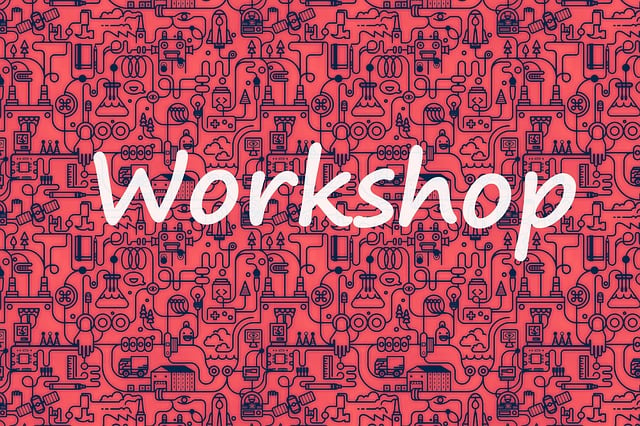Practical SEO Workshops: A Comprehensive Guide
Understanding SEO fundamentals is crucial for success in practical workshops. These sessions focus on interactivity, covering key concepts like keywords, backlinks, and on-page optimization through case studies, real-world examples, and hands-on activities. Facilitators use visual aids, group exercises, and Q&A sessions to ensure engaging learning. Participants gain skills in on-page optimization, keyword research, technical SEO, building backlinks, and measuring success using analytics tools. Case study analysis offers valuable insights into successful and unsuccessful campaigns. Workshops remain dynamic by setting clear goals, simplifying complex topics, encouraging participation, providing actionable insights, and gathering feedback for real-time adjustments.
Practical SEO workshops are essential for businesses aiming to master digital visibility. This article guides you through optimizing your online presence by covering crucial aspects, from understanding SEO fundamentals to implementing hands-on techniques. We explore interactive content design, keyword research strategies, technical considerations, and effective link-building methods. Learn from case studies and discover tips for dynamic workshop facilitation. Discover how these practical steps can elevate your SEO game and drive tangible results.
Understanding SEO Fundamentals: A Solid Base for Workshops

Understanding the fundamentals of SEO is a crucial step before attending any practical SEO workshops. It provides attendees with a solid base to build upon, ensuring they can grasp more advanced concepts during the workshop. SEO, or Search Engine Optimization, is the process of enhancing a website’s online visibility and ranking on search engine results pages (SERPs). By understanding key fundamentals like keywords, backlinks, and on-page optimization, participants can actively engage in hands-on workshops, applying these principles to real scenarios.
This foundational knowledge equips them with practical tools to navigate the complex landscape of SEO. Workshop facilitators often begin with an introduction to these basics, ensuring everyone starts from a common understanding. It allows for interactive discussions and collaborative problem-solving during group activities, making learning more effective and engaging.
Designing Interactive and Engaging Workshop Content

When designing content for practical SEO workshops, the focus should be on creating an interactive and engaging experience for participants. Divide the session into digestible segments with clear learning objectives. Incorporate hands-on activities, case studies, and real-world examples to illustrate key concepts. This ensures active participation and solidifies understanding through immediate application.
Use visual aids, such as charts, graphs, and infographics, to simplify complex topics. Encourage discussions and Q&A sessions throughout the workshop to address individual concerns and share diverse perspectives. Facilitate group exercises that simulate on-the-ground scenarios, allowing attendees to practice SEO strategies in a collaborative environment. Tailor content to cater to different skill levels, ensuring both beginners and advanced learners gain valuable insights from the practical SEO workshops.
Hands-on Techniques: On-page Optimization Strategies

In practical SEO workshops, participants gain hands-on experience with powerful on-page optimization strategies that are essential for boosting search engine rankings. These techniques focus on refining website content, meta tags, and structure to ensure they align perfectly with current search algorithms. By learning how to conduct thorough keyword research, optimize titles and headers, and create compelling, SEO-friendly copy, participants can significantly improve their websites’ visibility and attract more organic traffic.
Workshop attendees also explore the art of optimizing images, improving site speed, and ensuring mobile-friendliness—all critical factors that search engines consider when evaluating a website’s quality and relevance. These hands-on sessions empower individuals to implement effective on-page SEO tactics upon returning to their projects, making their websites more search-engine friendly and ultimately driving better results in online searches.
Leveraging Keyword Research for Effective Workshops

In the realm of Practical SEO Workshops, Keyword Research is a pivotal tool that enables participants to gain profound insights into their target audience’s online behavior. By delving into comprehensive keyword analysis, workshops can focus on delivering tailored content that resonates with search engine optimizers and digital marketers. This strategic approach ensures that each session is relevant and impactful, addressing the specific needs of those seeking to enhance their SEO skills.
Leveraging Keyword Research allows workshop facilitators to identify high-value keywords, understand competition levels, and uncover hidden opportunities. These insights can shape interactive activities, case studies, and best practices shared during sessions. As a result, participants walk away with actionable strategies they can immediately implement in their own projects, amplifying the overall value of the Practical SEO Workshops.
Technical SEO Considerations: A Practical Approach

In the realm of Practical SEO Workshops, Technical SEO Considerations demand a hands-on, tactical approach. Participants should expect to learn beyond theoretical concepts and engage in activities that directly address common technical challenges. This involves understanding crucial aspects like website speed optimization, mobile-friendliness checks, and ensuring structured data implementation for enhanced search engine visibility. By the end of these workshops, attendees should be equipped with practical strategies to identify and rectify on-page and off-page technical issues hindering their websites’ performance in search engine results pages (SERPs).
Workshops dedicated to Technical SEO offer a comprehensive roadmap for navigating the complex landscape. Through interactive sessions, participants gain insights into best practices for crawlability enhancement, XML sitemap creation, and error fixing. These practical skills enable website owners and developers to create robust digital assets that not only attract but also retain search engine crawlers, ultimately boosting organic reach. Staying informed about evolving technical SEO trends is vital, as search engines continually update their algorithms, making these workshops a game-changer for anyone aiming to stay ahead in the competitive digital space.
Building Backlinks: Strategies for Workshop Promotion

In the realm of Practical SEO Workshops, building backlinks is a vital component for promoting and enhancing online visibility. Workshop organizers should leverage various strategies to attract high-quality backlinks, ultimately driving more organic traffic to their event listings and related content. One effective approach is to reach out to industry influencers and popular blogs in your niche, offering them exclusive promotion or sponsorship opportunities in exchange for backlinks. Collaborating with reputable sources can significantly boost the workshop’s authority and reach a wider audience.
Additionally, creating engaging and valuable content related to the workshop topic can naturally attract backlinks. This could include comprehensive guides, blog posts, or even video tutorials leading up to the event. By establishing your workshop as a trusted resource, you encourage other websites to link back to your content, which not only improves SEO but also fosters a sense of community around your Practical SEO Workshops.
Measuring Success: Analytics Tools for SEO Workshops

Measuring success is a vital aspect of any workshop, and for practical SEO workshops, analytics tools play a crucial role in gauging the effectiveness of strategies taught. By utilizing robust analytics platforms, participants can gain valuable insights into their website’s performance after attending the sessions. These tools provide data on key metrics such as organic traffic, click-through rates, bounce rates, and conversion rates, allowing attendees to understand how their SEO efforts are impacting their online visibility and user engagement.
Workshop facilitators should guide participants in selecting relevant analytics tools tailored to their specific needs. Google Analytics is a popular choice for beginners due to its user-friendly interface and comprehensive tracking capabilities. Advanced users might explore more sophisticated options like Adobe Analytics or Kissmetrics, which offer deeper insights and customization for complex SEO strategies.
Case Studies: Real-world Examples for Effective Learning

Practical SEO workshops are renowned for their effectiveness in teaching participants real-world strategies. One of the most powerful learning tools is case study analysis, which allows attendees to explore successful (and sometimes unsuccessful) SEO campaigns. By studying these examples, participants gain valuable insights into what works and why—critical knowledge that can be directly applied to their own projects upon returning to their workplaces.
Case studies offer a tangible link between theory and practice, enabling workshops to serve as immersive experiences. Attendees learn from both the victories and challenges faced by previous businesses, fostering an understanding of SEO’s dynamic nature. This hands-on approach not only enhances learning but also ensures that practical SEO workshops remain relevant, given the constant evolution of search engine algorithms and digital marketing trends.
Tips for Facilitating Dynamic SEO Workshop Sessions

To facilitate dynamic and engaging Practical SEO Workshops, instructors should incorporate interactive elements that keep participants active and eager to learn. Begin by setting clear goals for each session, ensuring they align with the latest industry trends and best practices in SEO. Divide complex topics into digestible chunks using visual aids like diagrams, infographics, or short videos, which can help simplify intricate concepts. Encourage active participation through group discussions, hands-on exercises, and case studies that replicate real-world scenarios. Facilitators should also be prepared to answer questions promptly, fostering an environment where participants feel comfortable exploring various SEO techniques without hesitation.
Additionally, providing actionable insights and tips after each segment can help attendees implement what they’ve learned immediately. Share relevant resources, tools, or software demonstrations that can assist in their SEO endeavors post-workshop. Regularly collecting feedback during the sessions allows for real-time adjustments, ensuring the content remains relevant and effective. By combining theoretical knowledge with practical application, these dynamic workshops will empower participants to enhance their SEO strategies effectively.
